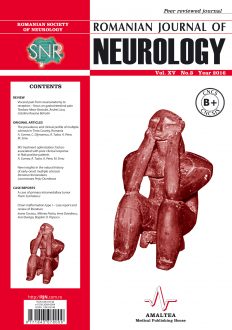SELECT ISSUE

Indexed

| |

|
|
|
| |
|
|
|

|
|
|
|
|
|
| |
|
|
HIGHLIGHTS
National Awards “Science and Research”
NEW! RJN has announced the annually National Award for "Science and Research" for the best scientific articles published throughout the year in the official journal.
Read the Recommendations for the Conduct, Reporting, Editing, and Publication of Scholarly work in Medical Journals.
The published medical research literature is a global public good. Medical journal editors have a social responsibility to promote global health by publishing, whenever possible, research that furthers health worldwide.
MS TREATMENT OPTIMIZATION: FACTORS ASSOCIATED WITH POOR CLINICAL RESPONSE IN NAB POSITIVE PATIENTS
A. Cornea, R. Tudor, A. Petre and M. Simu
ABSTRACT
Background and purpose. Interferon beta (IFN beta) belongs to the first line of disease modifying therapy drugs in the treatment of relapsing-remitting multiple sclerosis being widely used in the chronic treatment of this pathology. The serum presence of the neutralizing antibodies (Nabs) has been shown to alter the treatment response, its routine applicability being still debated. In an observational study, we aimed to determine in the Nabs positive patients, correlations with other clinical factors which contribute to IFN beta decreased efficacy.
Methods. We measured Nabs in 104 patients who were on IFN beta therapy (29.8% on IFN beta 1a s.c., 27.88% on IFN beta 1a i.m. and 42,3 on IFN beta 1b s.c.) for at least one year in our clinic. Serum was collected at 24 h after treatment injection to avoid transitory antibody peak (12-18 h post administration). We considered positive the patients with a titer higher than 20 TRU.
Results. The prevalence of Nabs in our group of patients was 13.43% (42.85% IFN Beta 1b s.c., 50% IFN beta 1a s.c. and 7.14% IFN beta 1 a i.m.). Nabs positivity was associated with an increase in the relapse rate (for IFB beta 1a and 1b s.c. groups) and progression for IFN beta 1 b s.c. patient group.
Conclusions. The routine clinical testing for Nabs should impact the clinical decision of switching therapy in multiple sclerosis patients that present with an increased number of relapses, EDSS progression or a higher number of MRI T2 lesions.
Keywords: Multiple sclerosis, neutralizing antibodies (Nabs), interferon beta (IFN beta)
Full text | PDF
